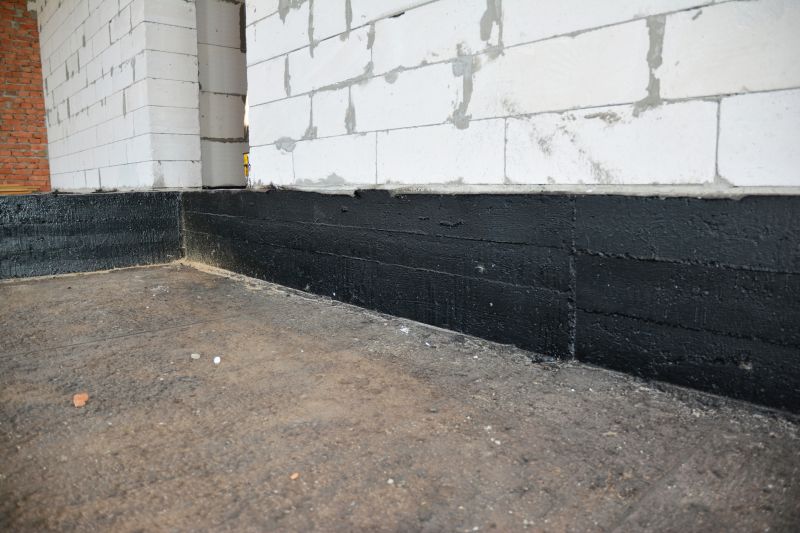Ultimate Guide to Essential Products for Concrete Waterproofing
Learn about the key products that help contractors deliver superior waterproofing solutions with ease.
 Concrete waterproofing products are essential for protecting structures from water infiltration and damage. These products help create a barrier that prevents moisture from penetrating concrete surfaces, which can lead to issues such as cracking, spalling, and mold growth over time. Proper selection and application of waterproofing materials are crucial for maintaining the integrity and longevity of foundations, basements, and other concrete structures.
Concrete waterproofing products are essential for protecting structures from water infiltration and damage. These products help create a barrier that prevents moisture from penetrating concrete surfaces, which can lead to issues such as cracking, spalling, and mold growth over time. Proper selection and application of waterproofing materials are crucial for maintaining the integrity and longevity of foundations, basements, and other concrete structures.
Top Overall Option
Comprehensive Liquid Waterproofing Membrane
A versatile liquid membrane that can be applied to various concrete surfaces, offering a seamless, flexible, and durable waterproof barrier. Suitable for both interior and exterior use, it adheres well to different substrates and provides a protective layer against water intrusion. Easy to apply with brushes, rollers, or spray equipment, it is a popular choice for many waterproofing projects.
Types of Products For Concrete Waterproofing Service
Liquid Waterproofing Membranes
Flexible liquid coatings that form seamless barriers on concrete surfaces, suitable for various applications.
Cementitious Coatings
Pre-mixed cement-based products that are easy to apply and provide a durable waterproof layer.
Bituminous Coatings
Asphalt-based coatings that offer strong resistance to water and weather elements, often used on below-grade structures.
Polyurethane Coatings
High-performance coatings that provide excellent elasticity and chemical resistance for waterproofing.
Sheet Membranes
Pre-formed waterproof sheets made from rubberized or bituminous materials, ideal for large surface areas.
Crystalline Waterproofing
Chemical treatments that penetrate concrete and form insoluble crystalline structures to block water ingress.
Waterproofing Sealants
Flexible sealants used to fill joints, cracks, and seams to prevent water penetration.
Hydrophobic Surface Treatments
Chemical solutions that repel water on the surface of concrete, reducing absorption.
Polyurea Coatings
Fast-curing, highly elastic coatings that provide a robust waterproof barrier.
Acrylic Waterproof Coatings
Water-based coatings that are easy to apply and suitable for various concrete surfaces.
Crack Injection Resins
Specialized resins used to fill and seal cracks in concrete, preventing water ingress.
Vapor Barriers
Sheets or coatings that prevent moisture vapor from passing through concrete surfaces.
Popular Choices
Flexible liquid coatings that form a seamless waterproof layer, suitable for various surfaces.
Self-adhesive or torch-applied sheets offering durable waterproofing for foundations.
Versatile sealants used to fill joints and cracks to prevent water penetration.
Pre-blended cement-based products that provide a reliable waterproof layer.
Chemical additives mixed into concrete to enhance water resistance from within.
Surface treatments that repel water and reduce absorption on concrete surfaces.
Quick-curing, flexible coatings suitable for demanding waterproofing applications.
Water-based coatings that are easy to apply and provide a protective barrier.
Flexible materials used to seal expansion and control joints in concrete structures.
Specialized paints that provide a waterproof surface finish.
There is a wide variety of waterproofing solutions available, each suited to different needs and conditions. Some products are designed for interior use, providing a sealant layer to prevent water seepage from inside. Others are formulated for exterior applications, creating a durable, weather-resistant coating that shields against rain, groundwater, and surface water exposure. Additionally, liquid membranes, cementitious coatings, and membrane sheets are among the common options used by professionals and DIY enthusiasts alike.
When choosing a concrete waterproofing product, factors such as the type of structure, exposure conditions, ease of application, and durability should be considered. Proper surface preparation, including cleaning and repairing any existing damage, is vital for optimal results. Regular maintenance and inspections can help ensure that the waterproofing remains effective over time, prolonging the life of the concrete structure.
Investing in high-quality waterproofing products can significantly reduce the risk of water-related damages, potentially saving on costly repairs in the future. Whether it is for a new construction project or an existing structure requiring maintenance, selecting the right product tailored to specific needs is an important step toward ensuring a dry, durable, and protected concrete surface.
Key Buying Considerations
- Determine the specific application area and choose a product suitable for interior or exterior use.
- Consider the exposure conditions, such as groundwater, surface water, or moisture vapor, to select an appropriate waterproofing solution.
- Evaluate the compatibility of the product with existing surfaces and materials to ensure proper adhesion.
- Assess ease of application, including whether the product can be applied with brushes, rollers, or spray equipment.
- Check the drying or curing time to plan the project timeline effectively.
- Review the durability and flexibility of the product to accommodate structural movements or temperature changes.
- Consider whether the product is suitable for sealing cracks and joints or for creating a continuous membrane.
- Look into the maintenance requirements and lifespan of the waterproofing solution.
- Ensure that the product complies with relevant building codes and standards.
- Evaluate the safety and handling instructions, especially for chemical-based products.
- Consider the cost relative to the coverage area and longevity of the waterproofing solution.
- Check for compatibility with other construction or repair materials used in the project.
- Review user feedback and expert recommendations for insights into product performance.
- Determine if the product requires professional installation or if it is suitable for DIY application.
- Assess the environmental conditions, such as UV exposure or chemical contact, that may impact product performance.
This content contains affiliate links and may earn commissions from qualifying purchases. All information is provided for informational purposes only and does not constitute an endorsement.
